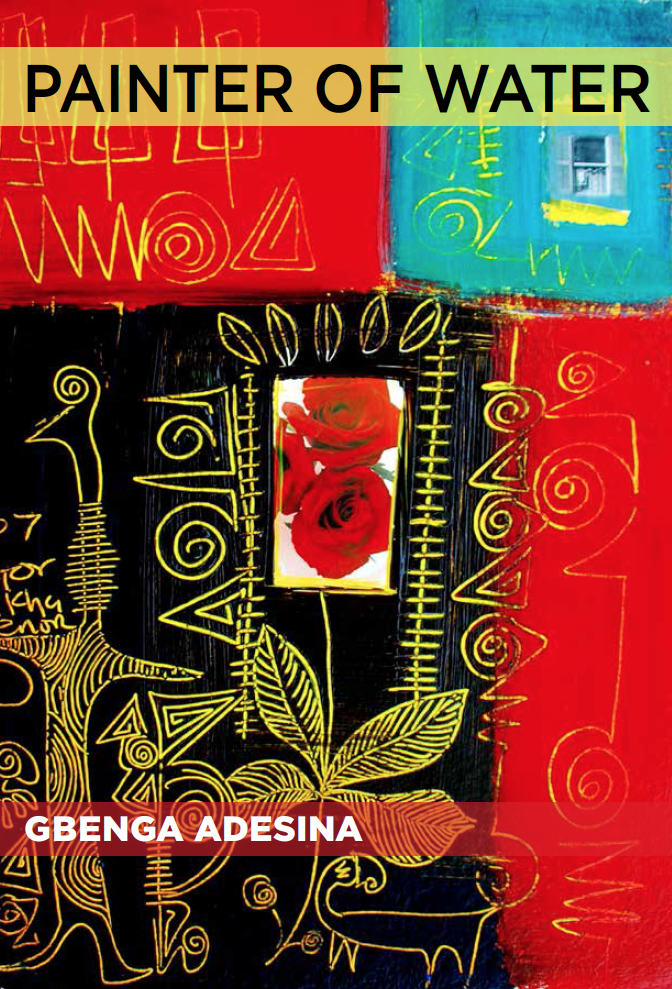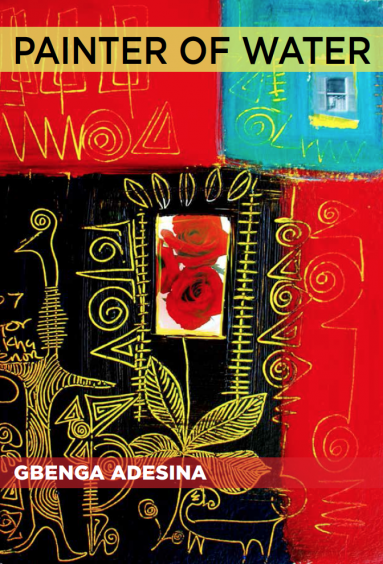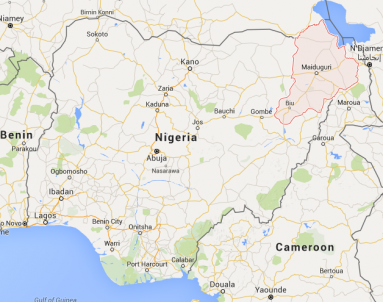(This is the second of eight chapbooks from this collection that Keguro Macharia and I are reading and thinking about. Read Keguro on Gbenga Adesina here.)
As with most chapbooks, there is a general singularity of purpose to Gbenga Adesina’s Painter of Water, a short book of poems which mostly focuses on the plague of war in northern Nigeria.
(This is not a criticism in the sense of a complaint; this is the point from which I can begin to criticize this poetry as poetry, to think about how it works, where it bends and where it will not, what it moves and what moves it. There is, it seems to me, a clarity with which this poetry describes the work of describing that it does not have when it comes to the thing it is describing. There is, it also seems to me, a point to that.)
So: Why must the work of mourning be done? And what work does mourning do? And, finally, why does the poet fear he will not be able to do it?
Let me come at it from another angle. Some of the most powerful moments in this and other poetry are the moments when language breaks down, when it visibly cannot bridge the distance it gestures towards. Language-breaking is powerful in a way that unbroken language is not (and anyway, what language is unbroken?). But here, the places where language breaks are where it isn’t rusted closed, or where it finds flexibility and movement from where it was closed. This is the work of poetry, the gesture which finds movement.
Take the phrase “that woman,” for example: “that” is a distancing phrase, indicating far and an expression of the speaker’s inability to know: “this woman” would indicate more closeness to the speaker, but “that” expresses the distance that makes her identifiable but not described: “that woman” can neither be understood or spoken or paraphrased. “This woman” can be embraced; “that woman” can only be pointed to, gestured towards. But that gesture and “cannot” certainly can be felt, and is.
In the poem “Christmas in Chibok,” for example, the speaker references “that woman of Ramah in Shiki, north of Chibok.” In one sense, this is a reference to a figure from an earlier poem, “Three Fifths of the World’s Songs,” a poem which describes “that woman in Shiki, north of Chibok.” She is a mother crying for her children, “cradling her songs in the open air…calling forth forgotten daughters to forgotten homes.”
“Shiki, north of Chibok” places this woman in Borno state, the part of Nigeria which has suffered the most from Boko Haram. The term “Chibok girls” frames the meaning of these daughters who have been lost.
“Ramah” is not a Nigerian place-name; it places us in Jeremiah 31:15:
“A voice was heard in Ramah, lamentation, and bitter weeping; Rahel weeping for her children refused to be comforted for her children, because they were not.”
At the start of the early poem “Three Fifths of the World’s Songs,” this mother in Shiki is the sort of mother the poet has never heard before (“I have heard mothers sing but not her kind”); he has no words for her song. He has read “this woman of Ramah” but “that woman of Shiki” is something he has not read. So he struggles to bridge the distance; he struggles to read and understand:
“When she sighed, it was a book crammed with many chapters…her face, a narrative told in wrinkles.”
By “Christmas in Chibok,” “that woman of Ramah in Shiki, north of Chibok” remains distant, but she has become the poem’s reference point, the vanishing point against which sorrow is plotted. In the early poem, “that woman in Chibok” demands: “How do you say in my country they buried my daughters alive for six months?”
By the later poem, it has become clear that the speaker takes this question personally; he hears her say “you” and asks himself “how do I?” And so he writes a Nigerian poetry out of this question, out of the imperative to find an answer.
Now, it may or may not be relevant to observe that the name Adesina places the poet in the generally Christian south of Nigeria; Shiki, Chibok, and Boko Haram are northern words for northern places and things, the part of Nigeria which is generally construed according to Islam. It may be relevant because this poetry is filled with biblical references to a war that has been suffered disproportionately by Muslims. Yet it may not be relevant because there seems to be no north and south here, only Nigerian, only the “you” that is to be found in “my country”; it may not be relevant because Rachel is a figure for loss to be found in both books.
When the poem “Christmas in Chibok” was first published in Premium Times, it had a brief introduction, an introduction which seems to have been excised from the chapbook version:
“In the privacy of my merry heart and the not so private laughter of my kin, I suddenly remembered the Chibok girls and their families and…and…colour just flew out of everything for me…for us…:”
It may or may not be worth noting that sometimes those who celebrate Christmas do not mourn the deaths of Muslims. It may not be worth mentioning because this collection is not about Islamophobia, but it is worth noting that “African” is a term for what makes northern and southern Nigeria parts of the same country. In “Christmas in Chibok” we are seeing a gesture like this one; the gesture of reaching across the division that cannot be bridged, but which can be felt; Rachel will not be comforted, but she can be embraced.
When I say jingle bell
amidst the din of my pollen daughters,
beautiful as solace in mother’s arms.
Chichi and Denike, 4 and 6, lithe as the intimation of joy,
in their small red dresses, laughing like love, those Lupita eyes,
braying around the house in kindred mischief,
smiling and dancing their little dances, jumping and
pulling at my shirt: “look at me look at me.” Their tongues
rolling out joy in unformed word: Daaaady!When I say jingle bell, my mind will become one
with punctured homes and vacant chairs in far Chibok
where silence and absence sit in place of daughters that once sang.When I say jingle bell, my mind will become one with
that woman of Ramah in Shiki, North of Chibok. Eyes
kohled in loss no words could touch, tending her wounds,
cradling her song in the open air.
This is the work of poetry, to make “jingle bell” something other than an expression of Christian identity; it is a gesture—and only a gesture—which longs to make here and far into one.
This is the work of the “painter of water,” which in the poem that gives the collection its name, is described as: “Words, brittle as the intimation of rain, try to say things only silence can speak.”
This paradoxical work—to make brittle words say what only silence can—is the same paradox as painting water, but in that moment, it is inverted. The speaker has learned something there, as the formulaic opening of the poem announces; “I once met a painter in Borno” signals the reader that something has been learned, that the poem will contain this lesson. This is what the painter in Borno said:
said not even bombs and their mournful tidings—
The forceful gospel of fire and such rust
Could unmake water, could unmake song.
This story of the “Chibok girls” has no happy ending, after all, only different kinds of worst. The president of Nigeria promises to rescue the Chibok girls, promises to do something about all of that, but this is poetry for where there is nothing to be done. For what poets can do—with the malleability for which “water” is idiomatic—is be moved, and to move someone: to cry.
This: Tears paint with water. And this work, this try, gives the poetry its drama, the soft, malleable point where something is at stake, the place where bells are not rusted shut, but jingle. And this drama—the drama of the poet, of art—subsumes the other drama, because that other is no drama at all. There is nothing soft or malleable about war, and certainly not this war: there is no happy ending, nothing moves or is moved, and whatever worst-case-scenario there might be, the prospect of avoiding it does not fill anyone with hope.


